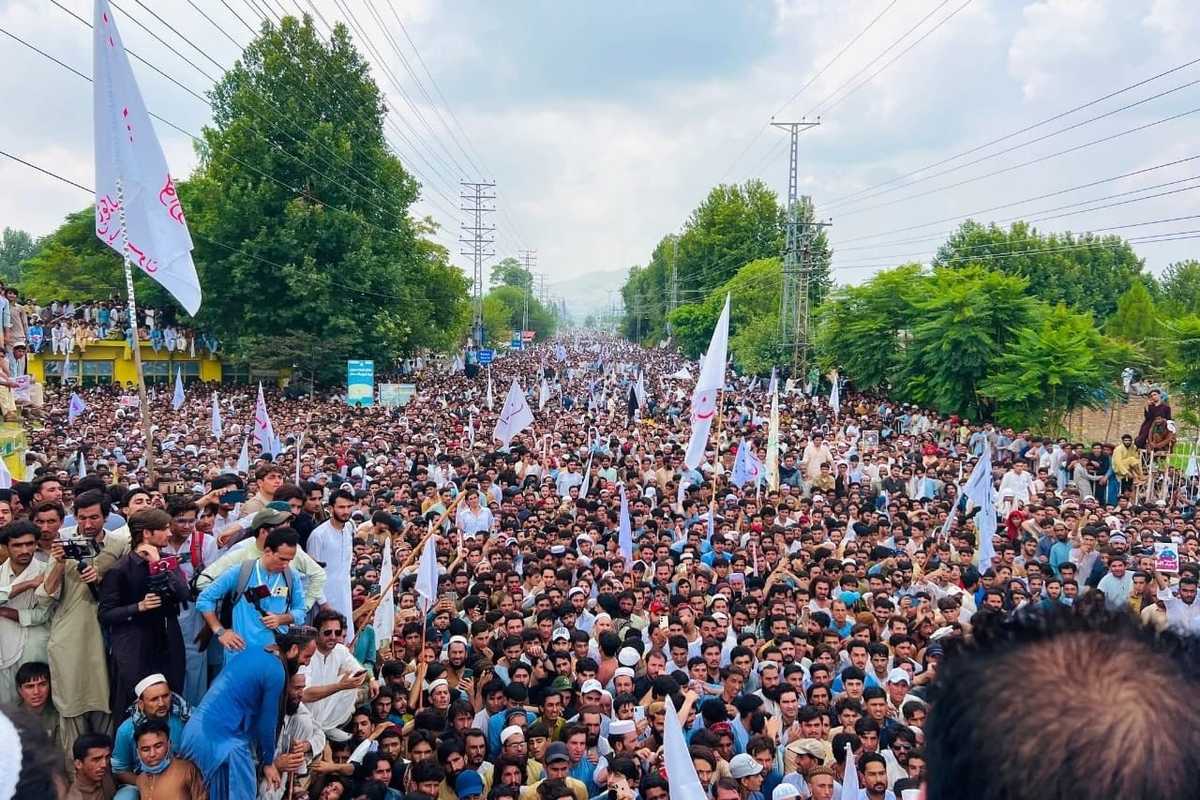Tribal leaders in northwest Pakistan warn of armed resistance if govt fails to curb violence
Pashtun elders give 10-day deadline to restore peace in KP’s tribal belt amid rising killings, extortion threats

Kamran Ali
Correspondent Nukta
Kamran Ali, a seasoned journalist from Khyber Pakhtunkhwa, Pakistan, has a decade of experience covering terrorism, human rights, politics, economy, climate change, culture, and sports. With an MS in Media Studies, he has worked across print, radio, TV, and digital media, producing investigative reports and co-hosting shows that highlight critical issues.

At a major peace march in Bajaur district, they gave authorities a 10-day deadline to meet their demands.
Nukta
Tribal elders and political leaders in Pakistan’s northwestern Khyber Pakhtunkhwa province have warned they may take up arms if the government fails to restore peace in the country’s restive tribal belt.
At a major peace march in Bajaur district, they gave authorities a 10-day deadline to meet their demands.
The march brought together elders, politicians, government officials, lawyers, traders and activists. They issued seven demands and five warnings to the state as violence surges in the region.
“We will not accept any military operation that leads to the displacement of residents,” the participants said in a joint statement.
They demanded an end to extortion, robberies and theft, and called for blood compensation for victims of the war on terror since 2005.
The elders also urged the Pakistani and Afghan governments to seek peace through dialogue rather than force. They condemned what they described as a decades-long “dollar-driven war” in the name of counterterrorism.
Warning of consequences if ignored, they said tribal communities would boycott all state institutions, shut down mineral sites and consider self-defense through arms.
“In case any perpetrator is killed during an act of violence, such action will carry the full support of the tribe,” they declared.
Plan for movement escalation
Prime Minister’s Special Assistant Mubarak Zeb, who attended the march, voiced alarm over the continued killings.
“People are being killed every other day — who is doing this and how? These terrorists are not birds that simply appear out of thin air,” Zeb said.
He pledged protests outside the Bajaur Scouts headquarters, and warned demonstrations could spread to Peshawar and Islamabad.
Former lawmaker Shahabuddin of the ruling Pakistan Muslim League-Nawaz accused both the federal and provincial governments of breaking promises.
“Anyone who kills our people is our enemy — and now we will rise against all of them,” he said.
Nisar Baz of the Awami National Party criticized the government’s failure to identify those behind the killings.
“If the state fails to punish those responsible, it will be seen as complicit in the murder of our martyrs,” he warned.
Maulana Abdul Rashid, a senior Jamiat Ulema-e-Islam-Fazl (JUI-F) leader, questioned why his community was being targeted.
“We are not against Sharia, we are not against Pakistan, and we are not against peace — then why are we being targeted?” he asked.
Calling for unity among political parties, Rashid said, “Unless all political leaders come together and confront this issue jointly, lasting peace will remain out of reach.”
Akhunzada Chattan of the Pakistan People’s Party said Pashtuns faced ethnic cleansing under the guise of war.
“This caravan for peace will continue — no one can stop it now,” Chattan said.
The Bajaur Aman March drew greater numbers after Awami National Party leader Maulana Khanzeb was assassinated days earlier while campaigning for the march.
Organizers announced plans to hold a final ‘Aman March’ in Islamabad with leaders from all political parties.








Comments
See what people are discussing